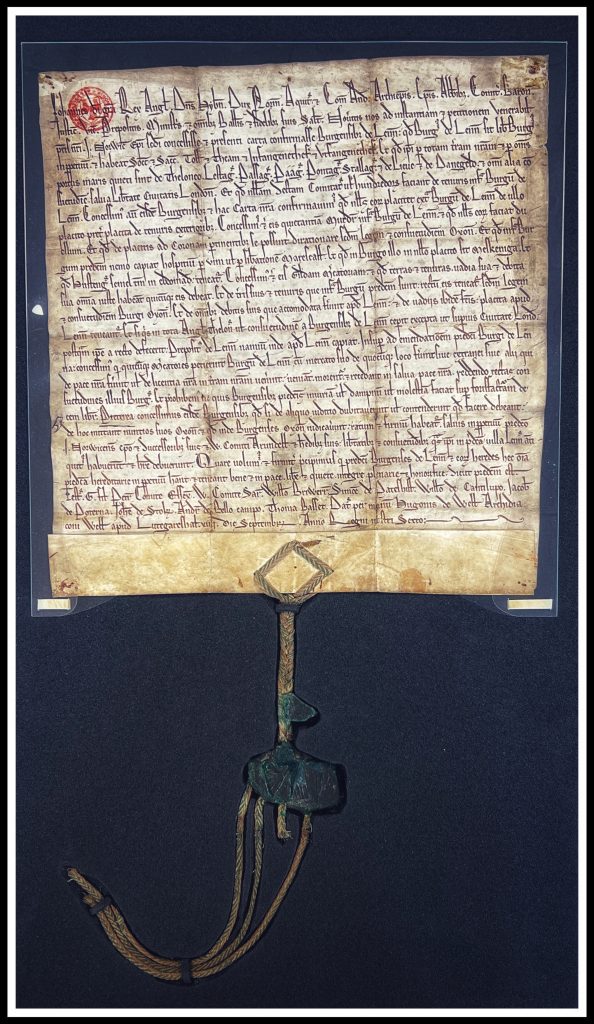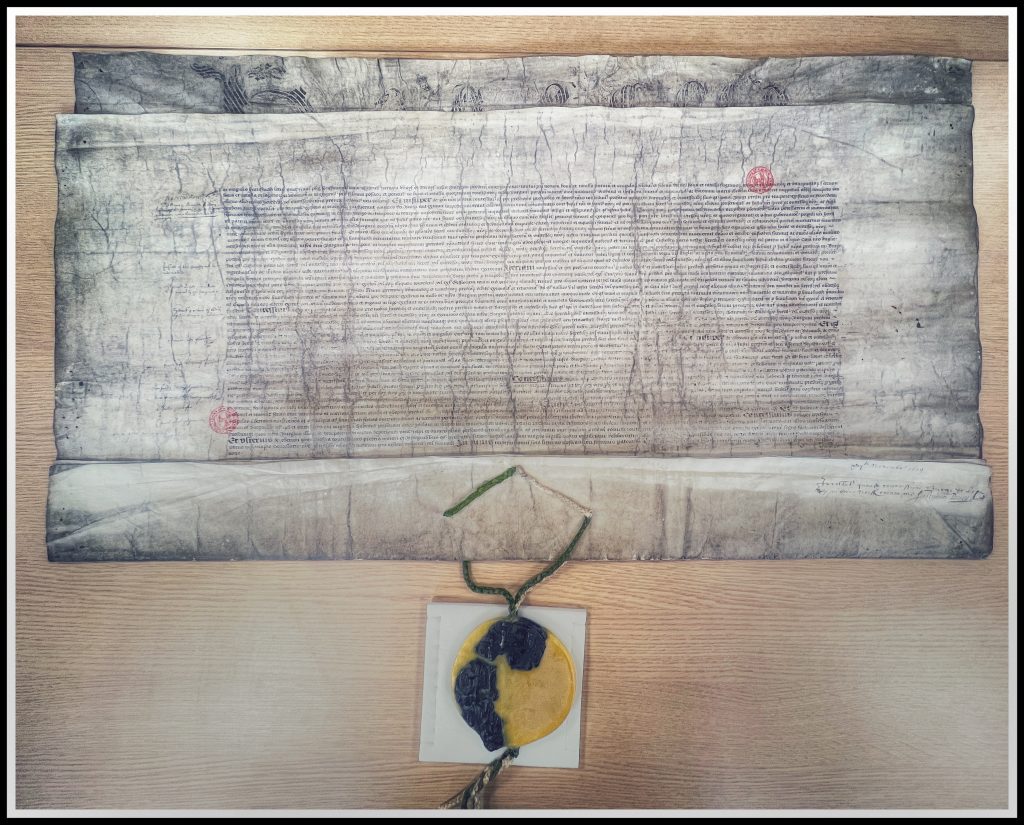Charters
A royal charter gave a community certain privileges, exemptions, and powers. And these usually related to charging or avoiding taxes and tolls, and to managing legal disputes. The most important of these benefits was considered to be the privilege of sending representatives to Parliament.
King’s Lynn possesses an almost unbroken series of charters from the beginning of the 13th century to the present time. It has sent representatives to Parliament since the reign of Edward III in the 14th century.
The Big Three
Arguably the most important charters for the town were made in 1204, 1524, and 1537.
1204 Charter (King John)
This charter gave the burgesses of Lynn exemption from certain tolls and taxes and the right to charge others in the town. The merchants had the right to have a gild. They had the right to determine justice in relation to property disputes. The existing liberties and customs in Lynn of the Bishop of Norwich and the Earl of Arundel were to continue unchanged. This ambiguity sometimes led to misunderstandings that needed to be resolved, and occasionally to conflict.
Where the rights of the town were uncertain the leaders were to consult the leaders of Oxford who had been given similar privileges to Lynn.
This charters established an oligarchical town government, inseparable from the Merchant Gild of the Holy Trinity.
Unfortunately, even when consulting Oxford, things were not always crystal clear. Before the English Civil War some burgesses from Lynn were travelling in Newcastle and argued that they had a medieval charter saying that they were exempt from tolls. The leaders of Newcastle argued that they had a medieval charter saying they could charge anyone tolls.

Photo © James Rye 2023
For a translation of the medieval Latin, and notes, see the Appendix below.
Unfortunately for the town the rights granted in this charter were temporarily lost in 1217 when the town aligned itself with some rebel barons who had not become reconciled to the new young king (Henry III). After their defeat by forces loyal to the king at a battle near Littleport, and a deputation sent to the king to apologise for the rebellion, a charter of 1223 restored the former rights and extended them indefinitely.
1524 Charter (Henry VIII)

Photo © James Rye 2023
Thomas Wolsey, Cardinal and Lord Chancellor of England, visited Lynn in 1520 and was lavishly entertained by the mayor, Robert Gerves. This visit is believed to have been orchestrated by the merchants to gain Wolsey’s support in their bid for independence for the town from the Bishop of Norwich. Given Wolsey’s strained relationship with the then Bishop of Norwich, Richard Nix, his intervention proved crucial in furthering the town’s cause.
In 1524 the town was reconstituted and was now to be governed by a mayor, twelve aldermen, eighteen common-councilmen and was to have a recorder, a town clerk, nine constables, two coroners, four serjeants-at-mace, and a clerk of the market. The corporation was invested with the authority of the crown to enforce law and order through several courts. The mayor and fellow justices had the power of life and death.
1537 Charter (Henry VIII)
In 1537 the borough was released from the authority of the Bishop of Norwich and “ … henceforth the borough instead of being called Bishop’s Lynn shall be styled King’s Lynn …”. The charter also gave stipulations about the number of courts that could be held and gave permission for two yearly fairs and two markets each week.

Photo © James Rye 2023
Appendix
Translation of King John’s Charter 1204
John, by the grace of God King of England, Lord of Ireland, Duke of Normandy and Acquitaine, and Count of Anjou, to the archbishops, bishops, abbots, earls, barons, justices, sheriffs, reeves, ministers and all his bailiffs and faithful men, greeting.Know that we, at the request and petition of our venerable father John, the second [of that name], Bishop of Norwich, have granted and by this present charter confirmed to the burgesses of Lenn, that the borough of Lenn may be a free borough for ever, and they may have soke and sake, toll and team, infangenthief and outfangenthief. And that throughout all our land and through all sea ports they may be free of toll, lastage, passage, payage, pontage, stallage and of leve and of Danegeld and of all other customs, saving the liberty of the city of London. And that they make no suit of counties or hundreds for tenures within the borough of Lenn. We have granted, however, to the same burgesses and by this charter have confirmed that none of them shall plead outside the borough of Lenn in any plea except for pleas concerning foreign tenures. We have granted also to them quittance of murder within the borough of Lenn and that none of them shall perform trial by combat. And that concerning pleas belonging to the crown they may prosecute their suit according to the law and custom of Oxford. And that within the aforesaid borough no one may take lodging by force, nor by livery of the marshals. And that in that borough in no plea may there be miskenning. And that a husting court shall be held once a week only. We have granted also to them a gild merchant and that they may have all their lands and tenures, securities and debts justly, whatever is due to them, and concerning their rights and tenures which are within the aforesaid borough, it is to be right for them to hold them according to the law and custom of the borough of Oxford. And concerning all their debts which shall be arranged at Lenn, and concerning securities made there the pleas may be held at Lenn. And if anyone in the whole of England should take toll or custom from the burgesses of Lenn, except, as above, in the city of London, and shall have made default in right, the reeve of Lenn may distrain in respect thereof at Lenn.In addition, for the improvement of the borough of Lenn we have granted that whichever merchants shall go to the borough of Lenn with their merchandise from whatever place they be, whether foreign or others who are at peace with us, or those have come by our leave into our land, they may come, stay and depart in our safety and peace having paid the just customs of the borough. And we forbid anyone doing injury or damage or annoyance to the aforesaid burgesses, under forfeit of ten pounds.Moreover, we have granted to the same burgesses that if in any judgement they should be in doubt or contention as to what they ought to do they may send their messengers to Oxford and what the burgesses of Oxford decide shall be valid and firm. Saving for ever to the aforesaid John, Bishop of Norwich, and to his successors and to William, Earl of Arundel, and to his heirs the liberties and customs just as they have had of old and ought to have in the aforesaid town of Lenn.Wherefore we do will and firmly order that the aforesaid burgesses of Lenn and their heirs may have and hold all the aforesaid things by inheritance for ever, well and peacefully, freely and quietly, wholly fully and honourably, as aforesaid.Witnesses: Geoffrey Fitz Peter Earl of Essex, William Earl of Salisbury, William Briwerr, Simon de Pateshill, William de Cantilupe, James de Poterna, John de Stoke, Andrew de Beauchamp, Thomas Basset.Given by the hand of Hugh of Wells, Archdeacon of Wells, at Lutegareshall the 14th day of September in the sixth year of our reign.
Notes
| soke and sake | An area within which a liberty of franchise granted by the king is exercised, and jurisdiction in matters of dispute. |
| toll and team | A right of jurisdiction in actions relating to title to goods and chattels. |
| infangthief and outfangthief | Authority to try a thief caught within the area of jurisdiction and to pursue a thief who had fled from jurisdiction. |
| toll | A duty on imports. |
| lastage | A toll on wares sold by last, or measure. |
| passage | A toll on passengers. |
| payage | Another toll on transit. |
| pontage | A bridge toll. |
| stallage | A toll on stalls at a market or fair. |
| leve | An exaction or compulsory gift. |
| miskenning | A penalty for an error in repeating the form of words by which a litigant was expected to state his case. |
| Lutegareshall | Lugershall, Wiltshire. |
© James Rye 2023
The author acknowledges the help of Luke Shackell, Archivist, King’s Lynn Town Hall, who provided access to the charters along with helpful explanations. Any mistakes are the author’s own.
Book a Walk with a Trained and Qualified King’s Lynn Guide
Sources
- Richards, P. (2024) A Political Revolution in Tudor Lynn: “To have an end between my Lord of Norwich and the Town of Lynn”: 500 Years since Henry VIII’s Charter of Borough Freedom (1524-2024), Lecture presented at the Town Hall, King’s Lynn
- https://www.british-history.ac.uk/hist-mss-comm/vol11/pt3/pp185-209#p3
- https://norfolkrecordofficeblog.org/2016/10/21/one-of-kings-lynn-borough-archives-earliest-documents-the-charter-of-king-john-to-the-burgesses-of-lynn-14-september-1204/

[…] At the request of John de Grey, Bishop of Norwich, King John gave Lynn the right to be a free borough, with rights of local jurisdiction, and freedom from tolls except in London. The town was also given the right to have a merchant guild. To help the town understand what this meant in practice, it was told to follow the law and custom of Oxford. The burgesses of Oxford were given the power to make decisions if disputes about interpretation arose. (See King’s Lynn’s Charters.) […]